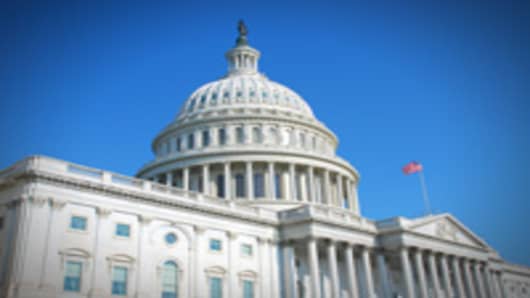When you buy and sell stocks based on secrets you learned at the office, it could be insider trading.
But when a United States Senator does it, it's probably perfectly legal.
That's because the SEC has largely determined that trading stocks based on advance knowledge of action in Congress is not insider trading.
If anything, it's "outsider" trading — buying and selling shares based on knowledge of an outside force that's about to hit a company's share value.
Think of it like a trader who sees a satellite image of a hurricane bearing down on an oil rig — and shorts the oil company’s stock in expectation of the damage.
Except in the case of Capitol Hill, the members of Congress can be both the trader and the hurricane — buying and selling shares in expectation of the effect that their own action has on the company’s stock price.
Some critics say that's probably going on a lot on Capitol Hill — although they don't have any direct proof.
“It’s really quite outrageous,” said Craig Holman, the legislative representative for Public Citizen. “If you just take a look at the statistics, members of Congress are either geniuses when it comes to stock trading or they are in fact trading off of some of this insider information.”
A pair of recent academic studies found that House members beat the market in their personal stock trading by about 6 percent, and Senators beat the market by about 10 percent.
In the 2011 study “Abnormal Returns From the Common Stock Investments of Members of the U.S. House of Representatives,” four university professors found that a portfolio that mimics the purchases of House Members beats the market by 55 basis points per month, or approximately 6 percent annually. That study looked at 16,000 common stock transactions made by approximately 300 House delegates from 1985 to 2001.
“Overall we find that the common stocks purchased by Members of the U.S. House of Representatives earn statistically significant positive abnormal returns. Our results indicate that Representatives, like Senators, also trade with a substantial information advantage,” wrote the study’s authors, Alan J. Ziobrowski of Georgia State University, James W. Boyd, of Lindenwood University, Ping Cheng of Florida Atlantic University and Brigitte J. Ziobrowski of Augusta State University.
The group also noted that stocks purchased by Democrats outperform stocks purchased by Republicans.
The SEC generally does not view trading on the basis of advance knowledge of Congressional action to be insider trading. Both House and Senate ethics manuals say that members of Congress are not supposed to make any personal profit from confidential knowledge, although no member of Congress has ever been publicly sanctioned for such trading.
Critics of the loose rules say they can’t prove that members of Congress or their staffs are actually trading and profiting from their positions, but they still believe that’s the only explanation for the returns members of Congress generate over time.
“It just boggles the imagination to think that members of Congress are so much smarter than we are and other traders that they just for some reason enjoy a much higher rate of return on their stock investments than the rest of us,” said Holman. “I just don’t believe that.”
And once again this year, two Democrats have introduced legislation called the STOCK Act — or Stop Trading on Congressional Knowledge Act — that would prohibit such political speculation.
Under the measure, sponsored by Reps Louise Slaughter, D-N.Y., and Tim Walz, D-Minn., members of Congress, their staffs, and others in Washington would face a new set of legal prohibitions.
The proposal:
- Prohibits Members and employees of Congress from buying or selling securities, swaps, security based swaps, or commodity futures based on nonpublic information they obtain because of their status;
- Prohibits Executive Branch employees from buying or selling securities, swaps, security based swaps, or commodity futures based on nonpublic information they obtain because of their status;
- Prohibits those outside Congress from buying or selling securities, swaps, security based swaps, or commodity futures based on nonpublic information obtained from within Congress or the Executive Branch;
- Prohibits Members and employees of Congress from disclosing any non-public information about any pending or prospective legislative action for investment purposes;
The bill has been proposed several times since it was first introduced in 2006, but it has never gotten as far as a floor vote in the House of Representatives. Supporters don’t hold out much hope this year, either.
Not everyone is convinced that Congressional trading is as rampant as the STOCK Act supporters think it is.
“There ought to be empirical research done to determine whether or not there’s actual trading going on,” said Jan Baran, a partner at the law firm of Wiley Rein LLP who specializes in government ethics rules. “All we’re doing now is speculating.”



